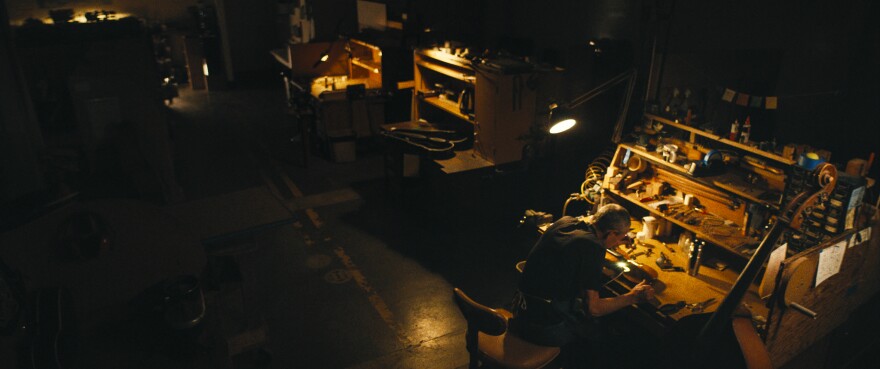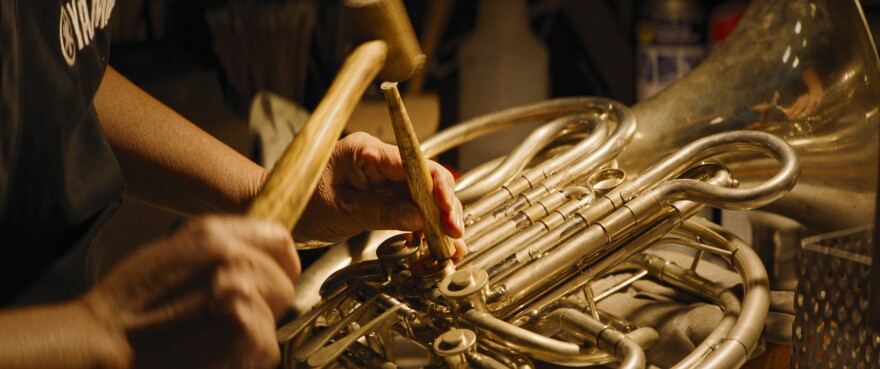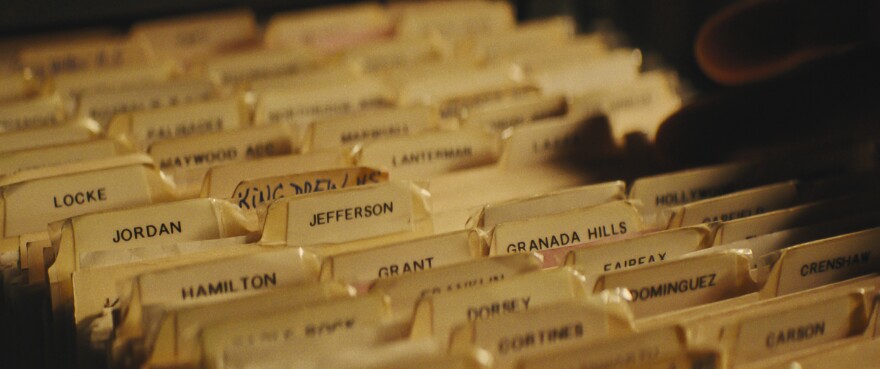Earlier this month, Wisconsin native and UW-Milwaukee alum took home his second Oscar. Josh Rosenberg is from Green Bay, studied broadcast journalism, and even interned here at WUWM before he went on to build his career in filmmaking.
Today, Rosenberg is the EVP of production at Breakwater Studios and was one of the producers of the documentary short film The Last Repair Shop. It’s a heartwarming story about a few devoted craftspeople that maintain over 80,000 musical instruments for students across Los Angeles public schools.
It’s the largest remaining workshop of its kind in America, and The Last Repair Shop takes you on a journey of learning about the people who dedicate themselves to repairing instruments for people they’ll never meet — and the children who are forever shaped by it. The short documentary is available on Disney+, Hulu and the LA Times Youtube.
This conversation has been edited for length and clarity.
Audrey Nowakowski: Before we get to the film, you interned here at our station for a time in 2005-2006. And apparently, that experience led you in the direction of film and far away from radio. So how did you discover film was your calling?
I've always been interested in telling stories. I was lucky enough in high school, we had access to cameras and Final Cut Pro, so I was able to kind of get into stories in that way. I loved the long-form storytelling that journalism offers, and actually did get to do some slightly longer stuff when I was at Milwaukee Public Radio.
It's just been this journey of trying to find the best avenue to tell the right stories. Like, every story is going to have the right length for it, the right medium for it. Throughout my career, I've done some stuff in narrative, I worked for Oprah Winfrey's company in Chicago and LA for a while. And found my way to Breakwater, where we are very passionate about telling these humanistic, short documentaries. We just feel like it's a space that is really an untapped resource. We're just pouring all the tools of cinema into trying to expand the audience base and create these stories that really couldn't live anywhere else but in the short doc.

Lina Tran: Well, you know, it's a natural path for anyone that has an internship at WUWM — going on to win an Oscar. Tell us what your work on The Last Repair Shop looked like.
This was an original project that Breakwater fully self-funded. A lot of times, these projects have a long life-cycle on them. We started shooting this film back in 2019. It’s one of those where it's like, you get enough money to go do another shoot, and then another shoot, so we're just kind of piecing it together.
Over that time horizon, I was the only producer that stayed on the project throughout the entirety of it. So a lot of it is like, keeping momentum for the project. We had a lot of different changes. We did the original interviews with the repair people. And then Kris Bowers, who's one of our co-directors on the film, was like, “We need to have the kids. There's something missing about the kids.” Then, you know, we found all these amazing kids that we ended up getting to film. You saw a number of them. You know, Porché, who's the young girl who went up on stage with Kris and Ben at the Oscars. A lot of it is just finding what the story needs, and then trying to facilitate what Ben and Kris need as the directors.

And then the last bit, which was so much fun, was the end credits sequence. We filmed that just last year, at the Eastwood stage at Warner Brothers, which, you know, the history of that room — so many amazing scores have been done there.
We had a 60-person orchestra. It was such a huge lift from the production team. It was such a beautiful moment of having this room filled with [Los Angeles Unified School District] alums, all playing the music that the audience gets to hear. You know, you having seen the film, could feel how impactful that was, because it really is the fruits of those labors. I think a lot of times in education, you do the work and you think you know the impact that you're having, but you don't get it reflected back to you. So that was the one thing that was just so impactful for our storytellers, the repair folks in this. Just getting what they mean to the community reflected back to them. That was really, really special for us, as filmmakers, to get to see that through their eyes.
LT: You mentioned that Kris felt it was so important to have the kids and it felt like they were this missing part. I love the structure of the film — it has this really tight structure where you're moving between kids and then the workshop workers. So why was that structure, that approach, so important? And how did that shape filming?
Sometimes you're working on projects, where there's a really tight deadline. Where the deadline is the driver, right? And as the creative person, you're almost subservient to the deadline. We had the incredible benefit — as I said, we started this project in 2019 — to really let this evolve in the way that was best for the film.
It's amazing, you know, sometimes you see a finished product, but to see all the different stages that it goes [through]. Like the order of the repair people, I cannot tell you guys how many debates were had. Like, who should be first, who should be last? Is this four short documentaries? Like, should each of these be their own short documentary?
There was just so [much] back-and-forth. And sometimes life and creating things, it just lines up like this, where it just so happened to be that the four strongest voices [of] the kids aligned with what the repair people did. Those are one of those things where you just kind of thank the film gods — whoever put this together. It’s just incredible that we had that as a device for the film. And yeah, hat’s off to Nick Wright, our editor, and Ben and Kris, for getting us to where the film just feels right.
AN: I mean, it feels so right. And the whole theme of this short is that an instrument isn't just an instrument, right? It can mean so much to the people playing them, whether it's providing opportunities through school or just an escape or something to do that's different. So did you grow up playing an instrument through school? And if not, how did working on the short make you feel about instruments and how they connect with people?
Yeah, I had a very brief musical career. I played the tuba in seventh grade. I kind of dabbled with the guitar, as I think all young boys in the aughts did. But you know, I was not really musically gifted.
So for me, it really is magic to me. And that's what was so impactful about being in the space when we were recording the score. Kris, who wrote “The Alumni” music for the end credits, wrote that in like a couple days. We had [a] 60-person orchestra, all these different sections, all the different sections had pieces that needed to be written. These musicians came in having only seen this music for, I think it was like a day.
The conductor brings up the conducting wand and then you're just in awe. You're in awe of all of these people coming together to create this emotion that you're feeling when you listen to the music. So you know, I've always been a lover and appreciator of music. But being able to witness that and seeing how beautiful that [is] is something I'll always remember.
LT: It's really incredible [at the end] because we're like, “Wow, that was amazing.” We think that it's over. And it’s like no, plot twist! Here's a really special performance. Also, that’s crazy that Kris wrote that in two days.
Yeah. And the crazy thing was, not only did he write that, because obviously he's co-directing the film with Ben Proudfoot. Then they had to figure out how are we going to film this, right? Because the challenge from our standpoint on production was not only did we need to record it, but we need to film it while we are there too. It's just this balance of giving the room over to the conductor to record the music. And then at a certain point, now it needs to come back to production so we can actually film it because we had to do all of those things in one day, basically.

AN: This film is really an example of how many people, how many moving parts it takes to not just make a short, but also with music, with an orchestra, with bringing things together for this one big sound. We've been talking about the last piece, The Alumni, throughout our chat today. Can you share with us what you were feeling? I'm sure stress was one of them. But day of, you're producing both the film and the music recording. How did you feel when you saw it on screen? You know, did you cry like we did when we saw it for the first time?
Oh, yeah. I mean, honestly, that’s when you know something's really working when you feel that. Because when you're one of the makers of it, you're so in the weeds of everything that you're doing. So whenever you're able to rise above that, you know something's really working.
That day, it was such a swirl of emotions. You're always trying to make your day and there's always the stress that's happening. I've been very fortunate to be on some amazing sets and amazing moments in my career. And I've always tried to take moments to like, give yourself a little mental snapshot. Like you said, we had over 100 people that day. It's always the most beautiful thing about being on a film set. You have this big group of people and they're all collectively using their time and talents towards a singular purpose.
I've never felt it more than in that moment, you know, whether they were the musicians or the studio staff at Warner Brothers or my production team. Everybody was working towards this purpose. It's so hard to describe it, but it is just like this electricity that you feel when you have that many people all trying to accomplish the same task.

LT: That's awesome. And so of course, your efforts were recognized. You guys won the Oscar for Best Documentary Short. What was your Oscars experience like?
It was really surreal. I had never been to the Oscars before. As a company, Breakwater Studios, we won the Oscar a few years ago for the Queen of Basketball.
But as a kid growing up having watched the Oscars and being a big fan of movies, being there was just really surreal. What I was so struck by was we were able to be there with the repair folks from the film and then also Porché and Ismerai, two of the students.
It's such an important thing that we can do to honor work that someone does and oftentimes honor work that people do in the shadows.Josh Rosenberg
What we love to do here at Breakwater is illuminate people who haven't been given their due. If you look back over the films that we've made over the last several years, we keep coming back to that. It's such an important thing that we can do to honor work that someone does and oftentimes honor work that people do in the shadows. So being there on the red carpet and holding the Oscar and seeing the look on their faces is just something that I'll always remember. Certainly, more than any celebrity sighting, which is, you know, it's fun. But just seeing how seen they all were and how appreciated they were. They were all in their tuxes and their dresses and they all looked like a million bucks. It was just such an incredible moment that I'll always remember.
AN: Well, Josh, we want to thank you so much for joining us to talk a bit more about The Last Repair Shop. We loved it so much. And I'm so grateful that we got to learn more about it from you.
In closing, I just want to say if anyone saw the film and they were inspired by it, we are launching a $15 million capital campaign to make sure that the last repair shop never goes away here in LAUSD. You can go to thelastrepairshop.com. And our goal is, like, let's have this in Milwaukee. Let's have this in Chicago. Our hope is that we can make this so successful here in Los Angeles that it can grow to other parts of the country. Obviously, as a Wisconsin person, I would love to see that spread to my home state.










